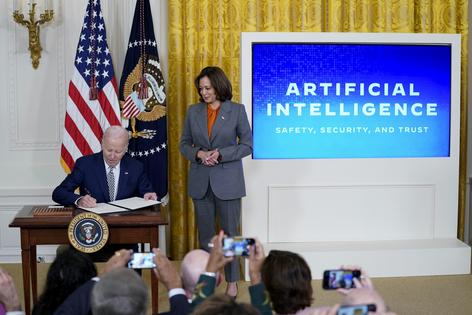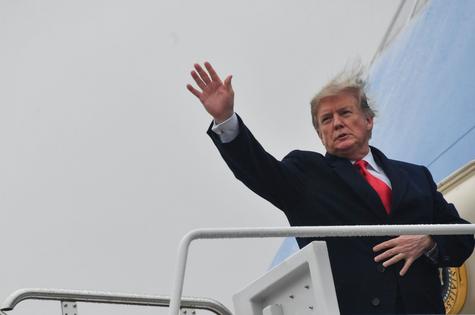AI, cryptocurrencies and data privacy: Comparing the Trump and Harris records on technology regulation
Published in Political News
It’s not surprising that technology regulation is an important issue in the 2024 U.S. presidential campaign.
The past decade has seen advanced technologies, from social media algorithms to large language model artificial intelligence systems, profoundly affect society. These changes, which spanned the Trump and Biden-Harris administrations, spurred calls for the federal government to regulate the technologies and the powerful corporations that wield them.
As a researcher of information systems and AI, I examined both candidates’ records on technology regulation. Here are the important differences.
With artificial intelligence now widespread, governments worldwide are grappling with how to regulate various aspects of the technology. The candidates offer different visions for U.S. AI policy. One area where there is a stark difference is in recognizing and addressing algorithmic harms from the widespread use of AI technology.
AI affects your life in ways that might escape your notice. Biases in algorithms used for lending and hiring decisions could end up reinforcing a vicious cycle of discrimination. For example, a student who can’t get a loan for college would then be less likely to get the education needed to pull herself out of poverty.
At the AI Safety Summit in the U.K. in November 2023, Harris spoke of the promise of AI but also the perils from algorithmic bias, deepfakes and wrongful arrests. Biden signed an executive order on AI on Oct. 30, 2023, that recognized AI systems can pose unacceptable risks of harm to civil and human rights and individual well-being. In parallel, federal agencies such as the Federal Trade Commission have carried out enforcement actions to guard against algorithmic harms.
By contrast, the Trump administration did not take a public stance on mitigation of algorithmic harms. Trump has said he wants to repeal President Biden’s AI executive order. In recent interviews, however, Trump noted the dangers from technologies such as deepfakes and challenges posed to security from AI systems, suggesting a willingness to engage with the growing risks from AI.
The Trump administration signed the American AI Initiative executive order on Feb. 11, 2019. The order pledged to double AI research investment and established the first set of national AI research institutes. The order also included a plan for AI technical standards and established guidance for the federal government’s use of AI. Trump also signed an executive order on Dec. 3, 2020, promoting the use of trustworthy AI in the federal government.
The Biden-Harris administration has tried to go further. Harris convened the heads of Google, Microsoft and other tech companies at the White House on May 4, 2023, to undertake a set of voluntary commitments to safeguard individual rights. The Biden administration’s executive order contains an important initiative to probe the vulnerablity of very large-scale, general-purpose AI models trained on massive amounts of data. The goal is to determine the risks hackers pose to these models, including the ones that power OpenAI’s popular ChatGPT and DALL-E.
Antitrust law enforcement – restricting or conditioning mergers and acquisitions – is another way the federal government regulates the technology industry.
The Trump administration’s antitrust dossier includes its attempt to block AT&T’s acquisition of Time Warner. The merger was eventually allowed by a federal judge after the FTC under the Trump administration filed a suit to block the deal. The Trump administration also filed an antitrust case against Google focused on its dominance in internet search.
Biden signed an executive order on July 9, 2021, to enforce antitrust laws arising from the anticompetitive effects of dominant internet platforms. The order also targeted the acquisition of nascent competitors, the aggregation of data, unfair competition in attention markets and the surveillance of users. The Biden-Harris administration has filed antitrust cases against Apple and Google.
The Biden-Harris administration’s merger guidelines in 2023 outlined rules to determine when mergers can be considered anticompetitive. While both administrations filed antitrust cases, the Biden administration’s antitrust push appears stronger in terms of its impact in potentially reorganizing or even orchestrating a breakup of dominant companies such as Google.
The candidates have different approaches to cryptocurrency regulation. Late in his administration, Trump tweeted in support of cryptocurrency regulation. Also late in Trump’s administration, the federal Financial Crimes Enforcement Network proposed regulations that would have required financial firms to collect the identity of any cryptocurrency wallet to which a user sent funds. The regulations were not enacted.
Trump has since shifted his position on cryptocurrencies. He has criticized existing U.S. laws and called for the United States to be a Bitcoin superpower. The Trump campaign is the first presidential campaign to accept payments in cryptocurrencies.
The Biden-Harris administration, by contrast, has laid out regulatory restrictions on cryptocurrencies with the Securities and Exchange Commission, which brought about a series of enforcement actions. The White House vetoed the Financial Innovation and Technology for the 21st Century Act that aimed to clarify accounting for cryptocurrencies, a bill favored by the cryptocurrency industry.
Biden’s AI executive order calls on Congress to adopt privacy legislation, but it does not provide a legislative framework to do so. The Trump White House’s American AI Initiative executive order mentions privacy only in broad terms, calling for AI technologies to uphold “civil liberties, privacy, and American values.” The order did not mention how existing privacy protections would be enforced.
Across the U.S., several states have tried to pass legislation addressing aspects of data privacy. At present, there is a patchwork of statewide initiatives and a lack of comprehensive data privacy legislation at the federal level.
The paucity of federal data privacy protections is a stark reminder that while the candidates are addressing some of the challenges posed by developments in AI and technology more broadly, a lot still remains to be done to regulate technology in the public interest.
Overall, the Biden administration’s efforts at antitrust and technology regulation seem broadly aligned with the goal of reining in technology companies and protecting consumers. It’s also reimagining monopoly protections for the 21st century. This seems to be the chief difference between the two administrations.
This article is republished from The Conversation, a nonprofit, independent news organization bringing you facts and trustworthy analysis to help you make sense of our complex world. It was written by: Anjana Susarla, Michigan State University
Read more:
Reining in AI means figuring out which regulation options are feasible, both technically and economically
Regulating AI: 3 experts explain why it’s difficult to do and important to get right
Health care under Harris versus Trump: A public health historian sizes up their records
Anjana Susarla receives funding from the National Institute of Health
































































Comments